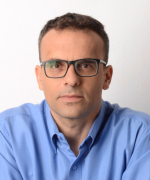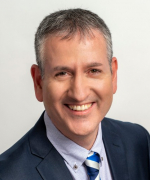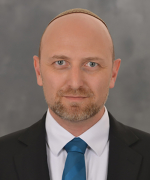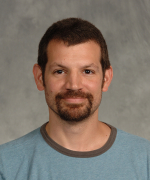
Avishay Gal-Yam Ph.D.
More info
Department of Particle Physics and Astrophysics
Born in Jerusalem, in 1970, Dr. Gal-Yam earned his BSc in physics and mathematics in 1996 and his PhD in physics and astronomy in 2003 at Tel Aviv University. He received NASA’s prestigious Hubble postdoctoral fellowship and spent four years conducting research at the California Institute of Technology. He joined the Weizmann Institute of Science in 2007.
Dr. Avishay Gal-Yam is a cosmic detective who attempts to identify the stars responsible for spectacular stellar explosions called supernovae. Solving these mysteries can provide vital clues for both the origins of the elements that make up the periodic table – including those necessary for life itself – and for cosmological questions about the origin and fate of the universe. For example, Dr. Gal Yam and his team of graduate students and postdoctoral fellows recently announced the discovery of two new types of supernova explosions. One very faint type – that occurs when helium detonates – appears to produce significantly more calcium (vital for life as we know it) and titanium than were thought possible, and probably contributes a significant portion of these critical elements in the cosmos. The second new type of mega explosions is called pair-production supernovae. These are 10 to 100 times more powerful than any previously known type and may be the first supernova explosions to have occurred after the "big bang."
In 2011, Dr. Gal-Yam, received the Krill Prize for Excellence in Scientific Research, and in 2010, the Israeli Physical Society (IPS) Prize for a Young Physicist, the German Federal Ministry of Education and Research ARCHES prize, and Weizmann’s Levinson Physics Prize. His previous honors and awards include a Colton Fellowship (2000), European Union fellowships (1999 and 2007), the Italian Città di Cefalù prize (2006), and the 2008 Peter and Patricia Gruber Award. He has published more than 100 papers in prominent scientific journals, including Nature, Science, and The Astrophysical Journal.
Dr. Gal-Yam is married and has three children. He enjoys sports, and he and his family like to travel and hike together.
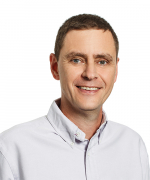
Mr. Yoav Waizer
More info
Yoav has more than 20 years of entrepreneurial experience working with private and publicly traded technology companies. As a partner and CFO at leading Israeli VC funds that include recently Medica Venture Partners and previously, Cedar Fund and Star Ventures, he has worked with start-up companies from their very early stages all the way to successful exits. His hands-on experience includes all aspects of finance and operations including tax planning and reporting, cash management, reporting to limited partnerships under US GAAP rules, investor relations, and has expertise in strategy, financial and legal due diligence, general and financial management, team-building, monitoring portfolio companies, raising capital and M&A.
Yoav holds a B.Sc. in Statistics and Accounting and an MBA with a specialization in Information Systems, both from Tel Aviv University.
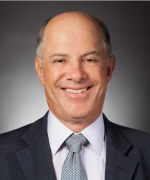
Mr. David Assia
More info
David Assia is a serial entrepreneur and angel investor, being one of the pioneers of the vibrant Israeli high tech software industry. David founded multiple global companies and listed them on either NASDAQ or TASE (Tel-Aviv Stock Exchange).
David is the Chairman of iAngels, a leading crowd funding platform and is also the Chairman of Biocatch, the Cognitive Authentication Biometrics Company. David is actively involved as a lead angel and a director in multiple high tech companies. David runs his family's, privately held, investment company, Nadyr Investments Ltd.
David is highly involved in educational institutions such as the Weizmann Institute of Science, the Israel Education Fund and Yeda Research and Development, the technology transfer office of the Weizmann Institute.
David is also on the boards of RR Media (RRSAT), a media services company, The First International Bank of Israel and the Israel Association of Electronics and Software.
In 1980, David co-founded Mashov Computers, the leading micro-computer software company in Israel, being one of the first high tech companies to be listed 3 years later on TASE.
In 1986, he co-founded Magic Software, where he served as either Chairman or CEO until 2007. Magic Software is a global international software company with world class innovative development and integration platforms. Magic Software was the first Israeli Software Company to be listed on NASDAQ (MGIC).
David was a major investor, either directly or through one of the above companies , in Aladdin Knowledge System, eventually merged into Safenet (Gemalto), Babylon.com, Walla Communications, Paradigm Geophysical, AOD Software and many others.
Since 2007, David has been involved in multiple start-ups as either an angel investor, chairman or mentor, such as in eToro, the world's leading social investment network.
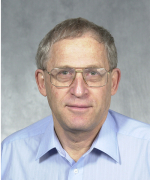
Prof. Zvi Artstein
More info
Born in Tel Aviv, Zvi Artstein received his Ph.D. from the Hebrew University of Jerusalem in 1974. After working as an assistant professor at Brown University for two years, he joined the staff of the Weizmann Institute of Science in 1975. He has held a number of senior posts at the Institute: he served as Head of the Mathematics Department from 1986 to 1988, Dean of the Faculty of Mathematics and Computer Science from 1989 to 1997, Chair of the Council of Professors in 1998 and Vice President for Technology Transfer from 1999 to 2002. In 2005, he was once again appointed Dean of the Faculty of Mathematics and Computer Science. He is the incumbent of the Hettie H. Heineman Professorial Chair of Mathematics.
An expert on the mathematics of decisions, control and optimization, Prof. Artstein deals with mathematical problems that arise when a natural or man-made phenomenon is subjected to manipulation. He examines various models for decisions made under conditions of uncertainty, stability and stabilization. Though rooted in abstract mathematics, these studies are applicable to diverse physical, industrial and economic systems.
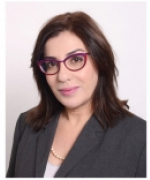
Prof. Irit Sagi
Born in Israel, Prof. Irit Sagi attended university in Washington, DC, receiving a BSc degree in Physical Chemistry from American University (1988), and PhD degree in biophysics/bioinorganics from Georgetown University (1992). She returned to The Weizmann Institute to perform postdoctoral research in the group of Prof. Ada Yonath, laureate of the 2009 Nobel Prize in Chemistry. Prof. Sagi continued her postdoctoral studies at the Max-Planck Institute in Berlin, and joined the faculty of Chemistry at the Weizmann Institute in 1998. Between 2005-2006 she spent a sabbatical as a visiting professor at Harvard University and at Novartis research institute, USA. She became the dean of the Feinberg Graduate School in 2014 and is the incumbent of the Maurizio Pontecorvo Professorial Chair. In December, 2019, she finished her term as dean and assume the position of Vice President for Technology Transfer.
Prof. Irit Sagi is developing and applying unique, multidisciplinary and biophysical approaches to investigate tissue and extracellular remodeling molecular processes. Merging together real-time spectroscopic and molecular imaging approaches, she was the first to reveal the complex dynamic molecular nature of extracellular remodeling enzymes including matrix metalloproteinases and lysyl oxidases (MMPs and LOX), a group of human enzymes linked to, developmental biology, cancer, inflammation, fibrosis and infectious diseases. Insights derived from these studies led her to design a new class of inhibitory antibodies that thwart the negative action of these enzymes. These prototype antibodies are currently being developed for clinical use in inflammatory, and cancer diseases by a start company, Mabtrix ltd. Prof. Sagi continues to develop novel integrated experimental tools tailored to decipher the extracellular matrix molecular remodeling code at near atomic resolution in healthy and diseased tissues. Her unique biophysical approach is used to decipher molecular mechanisms of dysregulated tissue proteolysis/remodeling and to develop a new generation of safe and effective drugs and in vivo molecular modulators. Recently, she demonstrtaed a novel use for proteases in promoting and increasing the rate of embryo implantation in mammals. This discovery led her to establish a new startup company, NanoCell, aiming at developing this technology in Livestock and human. Prof. Sagi is the incumbent of the Maurizio Pontecorvo Professorial Chair. She has more than 200 publications in peer reviewed scientific journals and editor of two books. Prof. Sagi earned the Landau Prize of Mifal Hapais for Biochemistry in 2017 and the Juludan Prize for outstanding research projects in the exact sciences and advanced medicinal technologies in 2013. In 2006, she was named Inventor of the Year by the Weiznmann Institute’s Yeda Ltd. Three years prior, she was awarded the Weizmann Institute Scientific Council Prize for Chemistry, and in 2000, she received the Jakubskind-Cymerman Research Prize. Fron 2009-20014 she has been the president of the Israel Biophysical Society and she is currently the president of the Israel Matrix Biology Society. Prof. Sagi is a member of the International Board of Directors of Future Fund for promoting Israel-Germany relations and she is a member of the UK Israel Science Council.
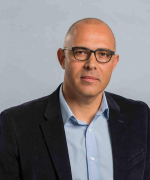
Prof. Alon Chen
More info
Prof. Alon Chen assumed the position of the 11th president of the Weizmann Institute of Science on Dec. 1, 2019. He was Head of the Department of Neurobiology from 2016-2019. He was also Managing Director and Scientific Member at the Max Planck Institute of Psychiatry, Munich, Germany and served as the Head of the Max Planck Society - Weizmann Institute of Science Laboratory for Experimental Neuropsychiatry and Behavioral Neurogenetics. He is an adjunct Professor at the Medical School of the Ludwig Maximilian University, Munich.
Born in Israel in 1970, Prof. Chen received a BSc in Biological Studies, with distinction, from Ben-Gurion University in 1995, and a PhD from the Weizmann Institute of Science in 2001 (Direct PhD Program, with distinction). During his PhD studies, Prof. Chen also received an MBA from Ben-Gurion University. He was a postdoctoral fellow at the Salk Institute for Biological Studies in California, where he started researching stress. In 2005, he joined the faculty of the Weizmann Institute, in the Department of Neurobiology. At the Weizmann Institute, he is the incumbent of the Vera and John Schwartz Professorial Chair in Neurobiology.
Prof. Chen’s research focuses on the neurobiology of stress, particularly the mechanisms by which the brain regulates the response to stressful challenges and how this response is linked to psychiatric disorders. The collective long-term goal of his research is to elucidate the pathways and mechanisms by which stressors are perceived, processed, and transduced into neuroendocrine and behavioral responses under healthy and pathological conditions.
His lab has made significant discoveries in the field, including fundamental aspects of the organism’s stress response and actions that link specific stress-related genes, epigenetic mechanisms, and brain circuits with anxiety disorders, depression, eating disorders, and the metabolic syndrome. Prof. Chen and his team use both genetic mouse models and human patients to ultimately create the scientific groundwork for therapeutic interventions to treat stress-related behavioral and physiological disorders.
Over the years in his various scientific and administrative leadership roles, Prof. Chen has worked extensively with scientific boards, executive boards, elected officials, alumni, donors, and the community at large, to advance the mission of the institutions in which he is involved. On many occasions, Prof. Chen has presented their visions, missions, and values to internal and external stakeholders. He has also been responsible for approving and overseeing institutional and departmental budgets and for securing external funding support. Prof. Chen is known for his excellent communication and interpersonal skills, strong leadership aptitude, and the ability to identify opportunities and to convert challenges into innovative solutions.
He is the recipient of both the Rothschild and Fulbright fellowships. Upon his joining the Weizmann Institute faculty, he received the Alon Fellowship, the most prestigious Israeli fellowship for returning scientists.
Prof. Chen is married with two children and has a keen interest in science education .

